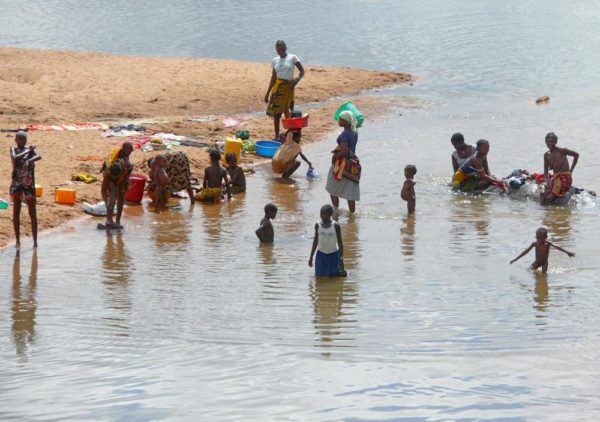 Rise in sea level has increased drastically in Nigeria as a result of climate change and global warming. For the past six years, parts of Nigeria experienced heavy downpour of rain, which leads to a water level of about 5 feet high. An obvious reason for the rise in sea level is the thermal expansion (warming of the oceans) and melting of the ice caps over land. In summary, we might keep experiencing floods, as it almost inevitable. But what we do to prevent it from destroying our environment and our lives is what counts.
Rise in sea level has increased drastically in Nigeria as a result of climate change and global warming. For the past six years, parts of Nigeria experienced heavy downpour of rain, which leads to a water level of about 5 feet high. An obvious reason for the rise in sea level is the thermal expansion (warming of the oceans) and melting of the ice caps over land. In summary, we might keep experiencing floods, as it almost inevitable. But what we do to prevent it from destroying our environment and our lives is what counts.As we all know, there are two seasons in Nigeria: dry season and rainy season. Most times we complain so much when it is dry season because of how dry and uncomfortable it can get. Rainy or wet season is usually not any better, because it comes with discomfort.
The National Severe Storms Laboratory explained flooding as an overflow of water into a land that is usually dry. According to United Nations Environment Program (UNEP), flooding is the excessive discharge of water beyond the capacity of the drainage. Flooding can be triggered by various reasons such as: spatial distribution of rainfall, rainfall density, topography, surface conditions and poor drainage. Flash floods, urban floods and river floods are a few of the different types of floods.
Factors such as poor agricultural practices, improper waste management, illegal structures and uncontrolled dumping waste from households can contribute to flooding. For example, when the drainages are blocked with plastic bags and bottles, it can hinder free passage of water into the drains, thereby causing floods.
Flooding in Nigeria mostly occurs as a result of accumulation of rainwater on saturated ground. Areas such as Lagos, Adamawa, Ogun, Oyo and Benue states are prone to flooding because of the flood-prone plains and closeness to riverbanks. Most floods require hours or days to develop, giving residents enough time to evacuate their homes or take the precautionary steps. The Federal Ministry of Environment in conjunction with UNEP say that parts of Lagos will be submerged in water by 2050. Another study shows that by 2100, the seal level rise in coastal areas of Lagos will range between 0.32m and 1.41m. Parts such as Lagos Island, Amuwo-Odofin, Eti-Osa, Epe, Kosofe e.t.c are at a higher risk.
Floods have devastating consequences on humans, animals and the environment. Asides this, floods destroy roads, houses, bridges and cars most especially. People are rendered homeless and communities are displaced. Chemicals from manufacturing companies are released into the environment and contaminate water bodies, thereby leading to extinction of sea animals. In countries such as Nigeria, flooding brings about a disruption in power supply, heavy traffics and general societal discomfort.
The environmental impact also comes along with the health impacts of flooding. Flooding causes various types of diseases such as water borne diseases, examples are: cholera, leptospirosis, hepatitis A e.t.c. Also vector borne diseases such as: dengue fever, yellow fever, malaria etc. Some other health effects are trauma, hypothermia in children (when trapped in flood water for long), respiratory tract infection, dysentery, pneumonia etc.
On the good side, flood brings about the movement of nutrients from one location to another, which enables crop production.
Here’s what to do before, during and after the flood.
Before
- Citizens, with the assistance of Government, should assist to clear drainages for easy flow of water during rainy seasons
- Afforestation i.e. planting of trees – this can help reduce the impact of the water in your area
- Government should review urban planning of states that are prone to floods.
- People should desist from building structures on the drainage and waterways.
- Build flood resistant structures (Levee) to withstand the pressure of water against the house
- Keep emergency lines close – by incase of emergencies.
- Have emergency supplies such as food, water, flashlight, clothing and phones
- Make sure your valuables such as cash, jewelries and documents are locked away in a waterproof pack
- Insurance is very important, especially for those on the island or areas prone to flood
During
- Ensure you and your loved ones are safe.
- Quickly evacuate to a safe environment – preferable a higher ground
- Avoid driving, or walking through, flood water
- If there is time, turn off electrical appliances to prevent hazards
- Ensure no chemicals around the office or home are left opened to prevent leakage into the environment
After
- Wash your body thoroughly because of the contaminated water
- Ensure the home/office is dried properly before turning on appliances
- For those offices/homes insured, take images of the damaged areas for insurance claim
- Clean the house with disinfectants as it might have been contaminated as a result of the flood.
If the Government delays in clearing the environment, it is our duty to come together as a community and ensure we are
flood-proof, by clearing our environment and planting trees. Educate people on the importance of a clean environment and how it can help prevent flood.
flood-proof, by clearing our environment and planting trees. Educate people on the importance of a clean environment and how it can help prevent flood.
Comments
Post a Comment